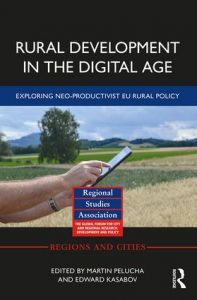The award of the Rector of the Prague University of Economics and Business for the prestigious publication 2020 in the category of book in 1st place was won by the author’s team led by Assoc. Prof. Martin Pělucha
- 1st place doc. Ing. Martin Pělucha, Ph.D., RNDr. Jana Kourilova, Ph.D., prof. RNDr. René Wokoun, CSc., Prof. Edward Kasabov – Faculty of Economics Publications: Rural Development in the Digital Age: Exploring Neo-Productivist EU Rural Policy, Routledge Publishing – Taylor & Francis Group, 2020 ISBN 978-0-367-35658-3
- 2nd place Jeremy Alan Garlick, M.A., Ph.D. – Faculty of International Relations Publication: The Impact of China’s Belt and Road Initiative: From Asia to Europe, Routledge Publishing, 2019 ISBN 978-0-8153-9610-9
- 3rd place Ing. Petr Vymětal, Ph.D., doc. Ing. Sarka Laboutkova, Ph.D., PhDr. Mgr. Vít Šimral, Ph.D. and Ph.D. – Faculty of International Relations Publications: Transparent Lobbying and Democracy, Palgrave Macmillan Publishing House (Springer Nature Switzerland AG), 2020 ISBN 978-3-030-36043-6
Official results are available on-line on this weblink.
The book focuses on defining the nature, contradictory and complex drivers as well as multiple impacts of period 4.0 policy within the specific territorial context of its implementation. It is commonly agreed within academic and policy circles that the contexts, trends, drivers and impacts that are currently morphing have the potential to determine the nature and boundaries of rural areas in the longer-term. In spite of such an agreement, understanding and examination of key contexts, trends, drivers and impacts during the current 4.0 period are largely missing – both from theoretical-intellectual and pragmatic-policy perspectives. Therefore, the book focuses and problematises the concepts: period 4.0 and rural development, territorial drivers of 4.0 rural development, design of the EU Rural Policy in the context of neo-productivist paradigm, and methodological evaluations of agricultural and non-agricultural rural policy tools. Compared to currently available publications on “rural development”, this book significantly deepens the analysis of the neo-productivism ‘innovations’ relating to rural development in the period of 4.0 that the EU is currently trialling. The book is not solely an intellectual project but seeks to inform practice constituencies (managers, analysts, and policy makers among others) regarding policy-making and neo-productivist EU rural development policy.
